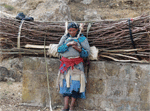Social Watch E-Newsletter - Issue 146 - September 20, 2013
Published on Fri, 2013-09-20 10:37
 |
| Issue 146 - September 20, 2013 |
|
|
| |
Putting the development agenda right
Despite significant macroeconomic growth over the past ten to fifteen years globally, especially in many developing countries, progress of key social indicators has slowed down since 2000. To a considerable degree this is the result of growing inequalities between and within nations.
In devising the post-2015 framework, the international community needs to move beyond the primacy of this narrow economistic metric toward a broad rights-based agenda rooted in the human rights principles that the international community has already endorsed and coupled with rigorous monitoring and accountability mechanisms, writes Roberto Bissio of Social Watch.
Read more
|
| |
|
| |

A woman carrying firewood in Ethiopia.
(Photo: LDC Watch)
|
The ongoing Post-2015 development agenda (including the SDGs) process is still short of prioritising the special needs and challenges of the LDCs and its peoples. The MDGs, albeit minimal in scope, has a dedicated target pertaining to the LDCs under Goal 8: Develop a global partnership for development.
Conversely, the proposed new-generation goals in the report by the UN Secretary-General’s High-Level Panel of Eminent Persons on the Post-2015 Development Agenda (HLP) dilute the due special development attention to the LDCs. A stand-alone goal targeting global development partnership for the LDCs is a non-negotiable along with a cross-cutting treatment with specific reference premised upon their special situations and vulnerabilities.
Read more
|
| |
|
| |
Brazilian development policy underwent a major transformation in the last decade, having the Brazilian Development Bank (BNDES, by its acronym in Portuguese) as the great symbol of this process. In 2004 disbursements by the bank were in the order of USD 40 billion, while in 2010 they totaled over USD 168 billion.
This growth by the bank occurred with a clear intention of the Brazilian government. The two main sources of bank financing are the Workers’ Support Fund and the National Treasury, but while the former has a fixed value (40 per cent of the fund), the amount deposited by the Treasury varies from Brazilian Real 43 billion in 2008 to a staggering 376 billion in 2012. However if the rise and importance of the bank in the last decade is unquestionable, the development model chosen raises many doubts.
Read more
|
| |
|
| |
This historic ILO Convention gives domestic workers the same rights as other workers.
The International Labour Organization’s Domestic Workers Convention, 2011 (No. 189) comes into force on 5 September 2013, extending basic labour rights to domestic workers around the globe.
Read more
|
| |
|
| |
|
|
|
| |
|
| Made possible thanks to the funding and support of Oxfam Novib and the Flemish North South Movement - 11.11.11. |
 |
| The contents of this publication are the sole responsibility of Social Watch and can in no way be taken to reflect the views of Oxfam Novib and the Coalition of the Flemish North South Movement - 11.11.11. |
|
|
|
|
